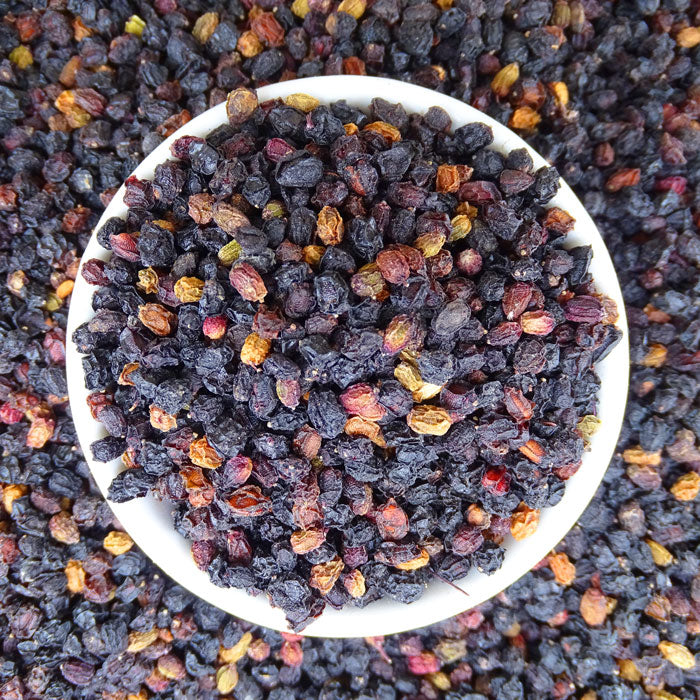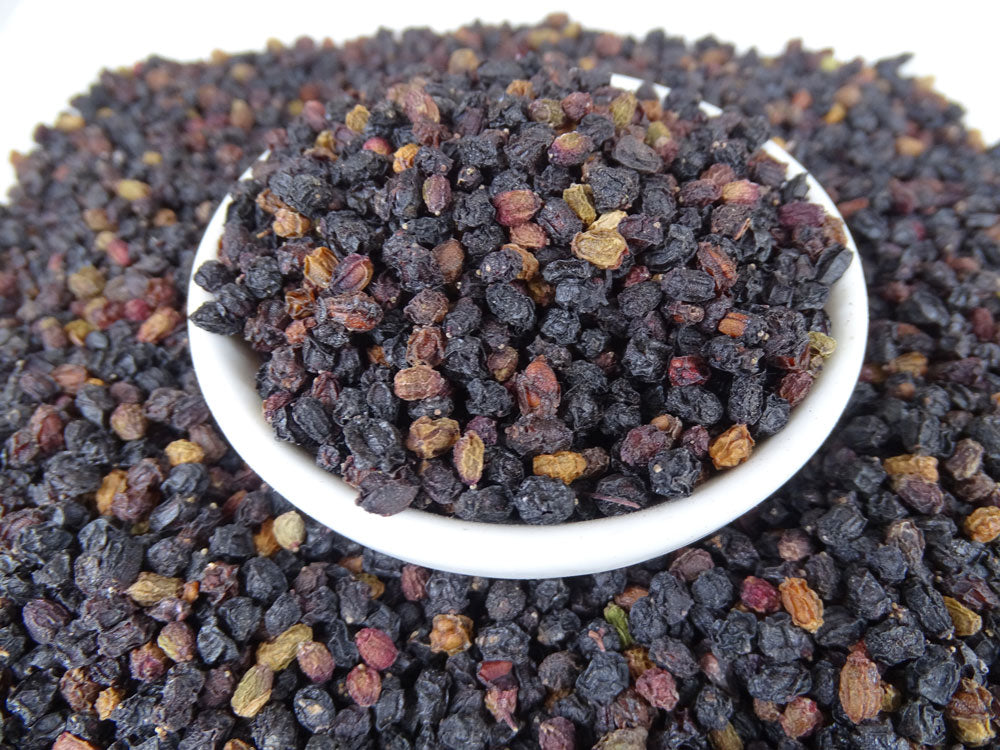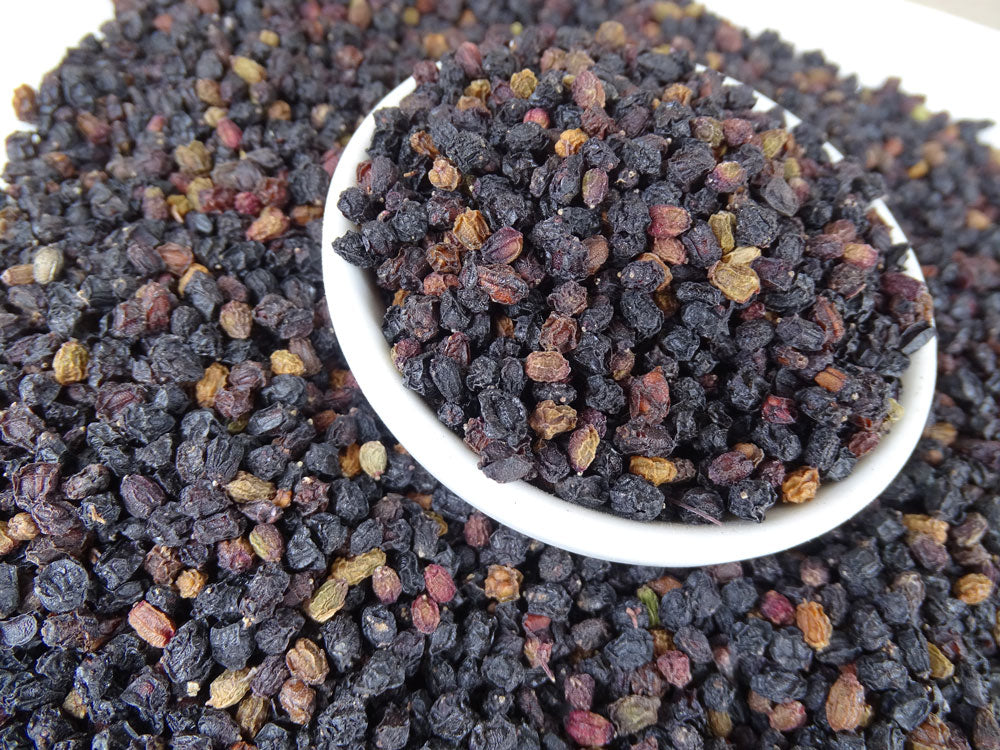For centuries across different cultures across the globe people have been savoring the delightful and flavorful elderberry tea brewed from the dark purple berries of the elder tree known as Sambucus nigra, for its comforting and aromatic properties. This herbal infusion is highly praised for its rich fruity taste and deep color. Promises of a warm and satisfying experience to those who relish bold flavors with a hint of natural sweetness.
Elderberry is recognized for its ability to enhance the immune system by strengthening the bodys natural defenses against cold viruses and other infections, like the flu.
Study: "Randomized study of the efficacy and safety of oral elderberry extract in the treatment of influenza A and B virus infections"
Elderberries are packed with antioxidants like flavonoids that shield the body from stress and combat inflammation effectively.
Study: "Elderberry flavonoids bind to and prevent H1N1 infection in vitro"
Elderberry tea is known to provide relief for issues such as congestion and sore throat commonly experienced during cold and flu season.
Study: "Anti-inflammatory effects of elderberry (Sambucus nigra) extract in acute lung inflammation"
Elderberry tea can help improve digestion by easing constipation and aiding in maintaining bowel movements due, to its gentle laxative properties.
Study: "Effects of an Elderberry Supplementation on Functional Gastrointestinal Disorders and Constipation in Adults: A Randomized, Double-Blind, Placebo-Controlled Trial"
Elderberry teas antioxidants can promote heart health by aiding in reducing cholesterol levels and enhancing blood flow to decrease the chance of heart disease.
Study: "The effects of elderberry on cardiovascular risk factors: A randomized, double-blind, placebo-controlled clinical trial"
Origin and Growing Profile
The elderberry trees originated in Europe, having been grown in various regions worldwide such as North America and Asia as well. These trees thrive best in temperate climates with drained and fertile soil, under a sunny environment; however they can also withstand partial shade. Harvest of elderberries usually takes place from summer to early autumn once the berries reach full ripeness and acquire their distinct dark purple hue.
These berries are famous for their anthyocyans that give them their vibrant color and intense taste. Growing in clusters and glossy texture makes these small berries a common sight in hedges or at the edges of forests and rural areas. The elder tree is considered a symbol of strength and rejuvenation across cultures due to its extensive use in traditional medicine and culinary traditions as well as its presence in folklore, over the ages.
Production and Harvesting Elderberries
Gathering elderberries requires a special touch since the berries are tiny and delicate in nature. They must reach ripeness before picking to capture their optimal flavor. Once plucked the berries are meticulously separated from their stems. Handling them with care is crucial to avoid any bursting and preserving their valuable juice intact.
After the elderberries are picked from the bushes in the fields or gardens and brought in for processing purposes; they are commonly dried to maintain their taste and prepare them for brewing into tea. The drying phase usually takes place in a controlled setting where factors such as temperature and humidity levels are carefully supervised to guarantee results without compromising the berries rich color and strong flavor profile by removing any extra moisture that may contribute to spoilage issues.
After the elderberries are dried out completely you can keep them for use in making a delicious and fragrant tea. The dehydrated berries are typically soaked in water to draw out their flavorful and fruity essence producing a deep robust infusion that is calming and enjoyable.
Characteristics of Taste
The unique taste of Elderberry tea is well known for its rich and full bodied flavor profile that strikes a balance between natural sweetness and a hint of tartness reminiscent of blackberries or dark cherries. Creating a bold yet smooth drinking experience thats comforting and delightful at any hour of the day.
The fruity scent of the tea is so welcoming and comforting this is like a blend of berries, with a touch of earthiness that really enhances the taste experience overall! When you take a sip of tea and savor it slowly you'll discover many subtle flavors and textures unfolding beautifully; first the sweetness hits your palate gently before transforming into a rich and slightly tangy aftertaste that leaves you craving more. The versatility of tea shines through as it can be enjoyed on its own or paired with various dishes for a delightful experience.
Whether you like your elderberry tea served hot or cold is up to you; its delightful taste is bound to bring satisfaction either way! This teas inherent sweetness makes it enjoyable without the addition of sweeteners; however a hint of honey or a squeeze of lemon can enhance its flavor wonderfully.
How to Make Elderberry Tea
To truly savor the fruity taste of elderberry tea to its fullest extent it's crucial to brew it correctly. Here is an easy to follow guide, for crafting the perfect cup...
- To bring out the flavor of the dried elderberries fully it's best to use freshly boiled water at approximately 100°C (212°F).
- For a serving of elderberry tea you can start with approximately 1 to 1 and a half teaspoons of dried elderberries for every 200ml of water used in brewing the tea based on your personal taste preferences and how strong you want the flavor to be.
- Steep the elderberries, for about 5 to 10 minutes to enhance the flavor. Steep equals stronger taste and shorter steep gives a more subtle brew.
Elderberry tea tastes great by itself. You can enhance it with a hint of honey for added sweetness or a slice of lemon, for some tanginess. For a luxurious experience try adding a dash of cinnamon or a couple of cloves while letting the tea steep.
What makes Elderberry Tea a good choice?
Those who enjoy the flavorful essence of dark berries will find elderberry tea to be an excellent option to indulge in its deep fruity taste and delightful scent anytime they desire comfort or relaxation throughout the year. Whether its relishing it warm during chilly nights or refreshing with an iced variation, on sunny days.
Opt for tea to delve into a rich history of herbal tea consumption, across different cultures and eras.The elder tree is admired for its strength and elegance while its berries have been incorporated into a variety of nutritious concoctions. By savoring elderberry tea you are partaking in an age old custom that honors the abundant offerings of nature.
The rich taste of tea allows it to complement various dishes effortlessly – ideal for enjoying with breakfast favorites like pastries and oatmeal or pairing with savory options such as cheeses and roasted meats. The hint of sweetness in the tea also makes it a perfect choice for a relaxing afternoon indulgence or a soothing way to end the day.
Elderberry tea not only tastes great but also looks beautiful with its rich purple color that is as appealing visually as it is to the taste buds. Thanks to its hue, it brings an extra touch of sophistication to your tea drinking moments making it suitable for everyday enjoyment or memorable events.
Whether you're just starting to explore teas or you're a long time fan of them already – elderberry tea is a delightful and distinctive choice that could easily become a beloved addition to your tea selection! With its taste profile and stunning appearance coupled with its inviting aroma; it truly stands out as an excellent option, for those who appreciate lifes little luxuries.







